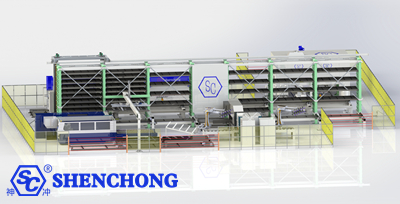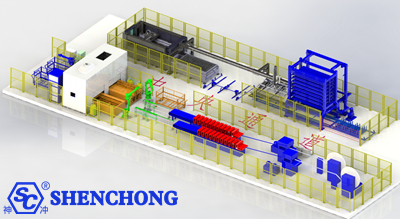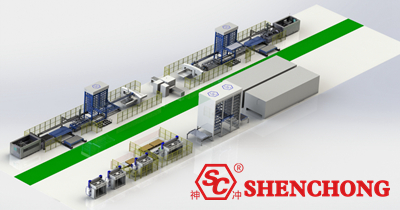
With the popularization and promotion of global intelligent manufacturing and Industry 4.0, the sheet metal industry and customers have increasingly higher requirements for intelligent factory and automated production line. Nowadays, it has become a basic option to require new factories and new equipment to have digital and information capabilities.
Among manufacturing enterprises, the sheet metal factory include common blanking workshops, material preparation workshops, stamping workshops, punching and shearing production lines, bending production lines, welding production lines, etc. A process link is a production unit. They are typical of the high-variety, low-volume discrete manufacturing industry.
For the informatization construction of the sheet metal factory, its informatization should have regular functions such as planning management, production management, material management, quality management, and equipment management. Combined with some characteristics of the sheet metal process itself, some unique personalized needs are also reflected at the information level. Therefore, when planning the sheet metal industry information system, in addition to conventional standard functions, demand analysis and functional design should also focus on the following characteristics.

Currently, news of factories becoming automated and intelligent continues to spread. Perhaps some companies have raised such a question: manufacturing industry has adopted manual production and manual statistics for so many years without any major problems. Why do factories have to be automated and intelligent? The answer is that many factories are facing serious management problems. Secondly, sheet metal factory automation, informatization and intelligence are the ultimate trends.
- The sheet metal factory's inventory of raw materials, semi-finished products, and finished products are all accumulating unknowingly, resulting in increasing inventory capital occupation. Failure to deliver goods on time often occurs, and the inventory of semi-finished products in the workshop increases.
- More and more resources are invested in warehouse management, but it still cannot change the fact that backlogs and out-of-stock phenomena are becoming more and more serious.
- It is difficult to grasp the quantity of each product in the current warehouse and the front-process, middle-process, and back-process lines.
- It is difficult to grasp the production time, downtime and idling time of production lines and processing equipment.
- It is impossible to determine whether equipment failure, scheduling errors, untimely supply of materials, insufficient worker training, or unreasonable process indicators affect equipment production capacity.
- It is difficult to automatically count and analyze product quality inspection data dynamically.
- Inability to accurately differentiate between random and abnormal fluctuations in product quality. Quality risks cannot be nipped in the bud.
- Out of stock and overstock always happen at the same time. Often after urgently purchasing materials, we find a large amount of inventory accumulated in a corner of the warehouse.
- Report data lags behind, making it impossible to respond in time and avoid errors.
- Faced with customer order demands, no one can tell the delivery time clearly. It is impossible to estimate whether the quotation is a loss.
With the continuous development of manufacturing industry, sheet metal processing, as one of the important manufacturing processes, is undergoing a profound change. The latest developments and trends show that automation, informatization, intelligence and leanness have become the key driving forces for the progress of the sheet metal processing industry.
Nowadays, the available labor force in factories is getting smaller and smaller, and labor costs are getting higher and higher. Therefore, the use of automated and intelligent mechanical equipment is an inevitable trend. With the popularization of intelligence, in order to achieve automation and intelligence in factories, in addition to equipment, systems are also very important. By connecting machines, remote management of equipment status and production status can be achieved, production plans can be reasonably arranged, and factory production efficiency can be effectively improved.
In the field of sheet metal processing, the widespread application of automation technology is bringing revolutionary changes to the production process. Automated equipment such as CNC bending machines, CNC punching machines and laser cutting machines. Not only improve production efficiency, but also reduce labor costs.
The application of industrial robots in sheet metal processing has also gradually become popular, allowing highly repetitive and complex work to be completed more efficiently, saving enterprises a lot of time and human resources.
With the rapid development of information technology, sheet metal processing companies are also increasing investment in information systems. The application of advanced manufacturing execution systems (MES) and enterprise resource planning (ERP) systems enables companies to better manage production plans, material flow and quality control. By monitoring production data in real time, companies can make decisions quickly and improve production flexibility and adaptability.
Intelligent production is not only limited to the use of automation equipment, but also includes the application of sensors, Internet of Things and other technologies. By installing sensors on equipment and workpieces, companies can monitor production processes in real time, predict equipment maintenance needs, and improve equipment utilization. Intelligent technology can also help optimize production parameters and improve product processing accuracy and consistency, thereby improving product quality and competitiveness.
The application of lean production concepts in the sheet metal processing industry is also increasingly mature. By carefully optimizing the production process, reducing waste and improving production efficiency, companies can reduce production costs.
At the same time, lean management also emphasizes employee training and participation, so that employees can better understand and master advanced production management concepts and promote the sustainable development of the enterprise.
In general, the sheet metal processing industry is moving towards more automation, informationization, intelligence and leanness. The introduction of these new technologies and concepts not only improves the company's production efficiency and product quality, but also brings new growth points and competitive advantages to the industry.

Smart factories are based on digital factories, using Internet of Things technology and monitoring technology to strengthen information management services, improve the controllability of the production process, reduce manual intervention in the production line, and rationally plan and schedule. Integrate emerging technologies such as preliminary intelligent means and intelligent systems to build a humanized factory that is efficient, energy-saving, green, environmentally friendly and comfortable.
Intelligent sheet metal factories and workshops have independent capabilities and can collect, analyze, judge, plan, and make predictions through overall visualization technology. Use simulation and multimedia technology to augment the reality to display the design and manufacturing process. Each component in the system can form the optimal system structure on its own. It has the characteristics of coordination, reorganization and expansion, self-learning and self-maintenance, and realizes mutual coordination and cooperation between humans and machines.
Global overcapacity has led to increasingly fierce competition among enterprises. How to improve production efficiency and shorten product cycle has become a concern around the world. The workshop is a basic component of the manufacturing industry. How to improve the intelligence level of the workshop and realize the digitalization of the production process is the current focus.
The current needs of some typical intelligent sheet metal factories mainly include the following aspects:
(1) Production management of multiple processes and processes. Including cutting, bending, welding, polishing, transportation, warehousing, quality inspection and other links.
(2) Integration of multiple systems and multiple devices. Like ERP, MES, WMS, PLM, CAM, CNC, PLC, barcode system, etc.
(3) Automatic layout and automatic sorting of multiple varieties and small batches of sheet metal workpieces. These include automatic association of orders, nesting design drawings, etc.
(4) Management of intelligent warehousing and logistics distribution. Not only the warehousing and warehousing of raw materials, but also the warehousing and warehousing of finished and semi-finished products and line warehouse management.
(5) Barcode management and quality traceability. Coding, pasting, scanning and tracing of workpieces and raw materials.
(6) Sheet metal production line monitoring panel and management visualization. Real-time display of production status, equipment status, work efficiency and other data, etc.
(7) Data analysis and application. Such as predictive maintenance, fault alarm analysis, etc.
(8) Training and virtual display. Such as operational training, digital twin display, virtual model drive, visits and sales demonstrations, etc.
Smart workshops are the cross-fusion of digital, networked, automated, intelligent technology and manufacturing technology. Focus on coordinating production processes and optimizing production processes. An efficient manufacturing model that realizes the optimization and integration of planning, production, inspection, logistics and other links. The foundation and core of building an intelligent workshop is informatization and automated management.
The sheet metal industry solution provides several major business modules including planning, processing, transmission, quality control, and warehousing, and comprehensively carries out work such as business status quo process sorting, pain point analysis, future process and business changes, and high-level solutions. At the same time, we will implement information solutions for the sheet metal industry that connect the entire value chain to address several long-standing pain points in sheet metal factories.
There are four main steps to transform a sheet metal factory into an intelligent one:
First, clarify the topic of intelligent development. Describe the ideal factory state to identify problems that need improvement.
Second, start with simple questions. Don't create complex management benchmarks and avoid starting with cumbersome applications.
Third, determine the personnel who will promote the intelligent development of the enterprise. This person needs to have an unyielding spirit in the face of all kinds of opposition from the company. At the same time, management personnel should also participate.
Fourth, verify the effect of intelligent promotion. Frequently verify the effectiveness of management and stop ineffective management in a timely manner.
In lean production, the transfer of materials is considered a non-value-added activity and a waste. The main reason is that the logistics process does not change the status of the product and cannot increase the added value of the product. Moreover, the transmission of materials not only takes up production space, but poor process arrangement also takes up production cycle time, causing an increase in production costs and leading to waste.
However, this non-value-added activity must exist in the production process. Therefore, how to reduce the proportion of material transfer links in the production process has become a problem that production arrangers must think about and solve.
Sheet metal factories have many types and specifications of raw materials, which are generally stored in stacks. This makes finding and transferring materials very slow, reducing production efficiency. The use of automated feeding equipment can effectively solve such problems.
There are three common solutions: a dedicated machine-based independent raw material warehouse feeding system. Most of these solutions are single-row and directly connected to the equipment. They can serve supporting equipment and achieve semi-automatic or automated production.
Large-scale universal metal material warehouse transfer system, this type of automated warehouse solution can provide sufficient storage space and can greatly improve the extraction speed of sheets, but it needs to be matched with a powerful control system.
There is also an automated solution for thin sheet coils that enables high-speed on-the-fly cutting processes. This production line can continuously uncoil and blank at high speed. At the same time, it also increases output and improves the practicality of the equipment. And for sensitive materials such as aluminum alloys, this process also ensures that no damage will be caused to the material surface during the transmission process.
The multi-level work orders and processes within the sheet metal workshop are intertwined, and it is difficult to match the breakpoints before and after the value stream. There are differences in single piece management and process routes between processes, making it difficult to manage through work orders.
On the other hand, there are multiple work orders for the same barcode in multiple work sections. The process route is complex, inventory information is opaque, and materials are transported manually frequently. Therefore, the informatization of production scheduling and equipment control in sheet metal factories has become the biggest difficulty and key point.
The sheet metal factory information solution integrates the world's top algorithm engine and is based on an independent and controllable intelligent manufacturing operation management platform. Refining knowledge and improving computing power to achieve efficient production, visual control, refined operations, intensive management, systematic integration, and platform expansion to empower the high-quality development of sheet metal factories.
In sheet metal processing, the raw materials for stamping and cutting are usually metal sheets or coils. In order to improve the utilization rate of raw materials and reduce waste and anticipation, nesting (layout) software is used in many sheet metal processing. The software system automatically simulates and arranges the sheet metal parts, and provides the nesting results to the sheet metal equipment for operation.
In this process, in order to realize the scheduling and monitoring of sheet metal operations, the control software needs to be integrated with the nesting software. Through integration, the control software and nesting software jointly formulate production plans, improve production rhythm and reduce material waste.

For sheet metal operations of small and medium-sized parts, one raw material plate will usually produce multiple parts after processing. It is necessary to sort, classify, summarize and label parts. Therefore, the intelligent sorting system needs to manage the sorting operations and the identification of sorted parts.
Materials can be identified and managed through containers or material frames: they can be sorted into different material frames by type of parts according to the sorting list. Mark the material frame with QR code/barcode or RFID. Part quantity and specification information are associated with material frame information to realize material management of sheet metal parts.
In the digital era, more and more sheet metal processing companies are engaged in digital and intelligent transformation and upgrading. Many manufacturing companies have solved the pain points of design, R&D, production, manufacturing, warehousing, logistics, sales services, etc. through digital transformation and upgrading, and also connected the breakpoints of the industrial chain and value chain.
Information construction is a complex process that requires comprehensive consideration of multiple factors such as technology, personnel, and processes. Successfully implementing informatization can improve a factory's competitiveness, but it requires a clear strategy and long-term commitment. When digital construction becomes an important topic for enterprises, every enterprise is affected by the digital world and becomes a beneficiary but also faces many challenges.
The sheet metal factory information solution is a pioneering exploration based on more than 20 years of sheet metal processing intelligent equipment manufacturing experience and technology accumulation. Following the construction footprint of multiple benchmark factories, we found that achieving the height of intelligent manufacturing is not achieved overnight and requires scientific planning based on best practices. Take one step at a time and work hard to provide usable solutions that customers really need.